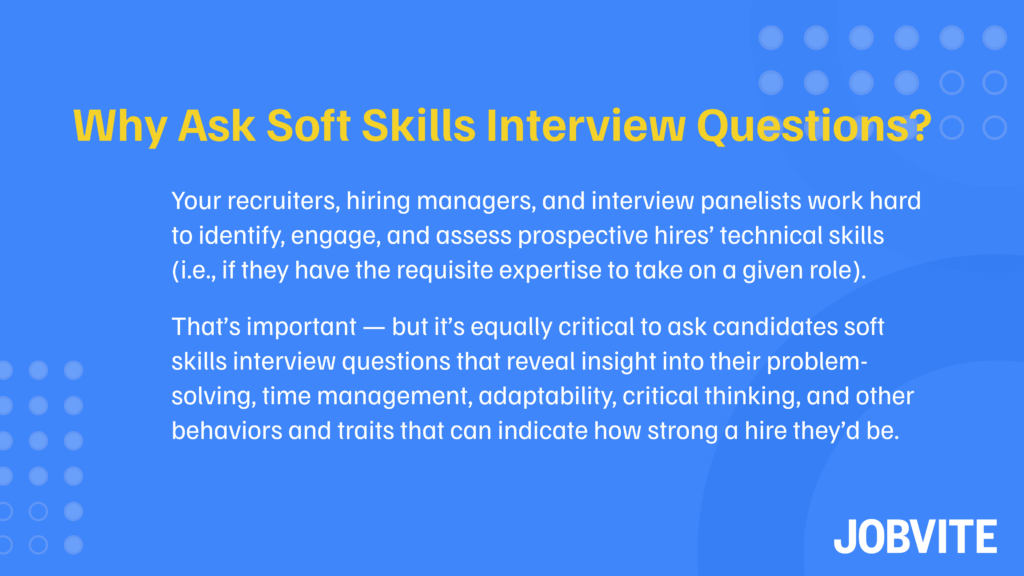Don’t be fooled by the name: There’s nothing “soft” about soft skills. If anything, soft skills are one the sturdiest, most reliable indicators that a candidate is the right choice for your organization.
In contrast with hard skills, which are the technical job skills acquired through formal education or training programs, soft skills aren’t easy to learn or quantify. Nevertheless, they are just as important to an employee’s success as technical skills.
When assessing soft skills of candidates you’re interested in, you’ll want to look out for things like:
- Problem-solving: Is a potential candidate’s ability to develop solutions to challenges evident?
- Working style: Does a candidate’s approach to work align with how your organization works?
- Communicating effectively: How well does a prospect communicate in and outside their team?
- Time management: Can a candidate can prioritize their tasks in an efficient and effective way?
- Meeting deadlines: Does a candidate complete work on (or ahead of) due dates historically?
- Stress management: Can a prospective hire handle situations deemed difficult with relative ease?
- Adaptability: In what ways has a candidate shown they can be flexible as goals/needs change?
- Critical thinking: Has a candidate proven they approach projects and issues with a critical lens?
- Take-charge attitude: Does a given candidate exude leadership skills when given situational=
These are skills — personal traits and behaviors, really — that enable employees to fully leverage their technical skills, collaborate cross-functionally, and better contribute as both a team member in their respective business unit and to the company as a whole.
In short, it’s crucial for your organization to place a greater emphasis on finding candidates with exceptional soft skills. But, how do you evaluate something that can’t easily be quantified?

Why soft skills are so important today
A recent Stanford Research Institute International and Carnegie Melon Foundation study found soft skills are a much stronger predictor of long-term job success than technical skills. In fact, the research suggests that up to 75% of job success is attributable to workers with well-developed soft skills.
With this in mind, it’s no surprise that more businesses are shifting their recruitment strategies to focus on hiring for soft skills over technical acknowledge. After all, technical skills can easily be taught — but if a candidate isn’t a good fit for your company, there’s not much that can be done to fix that.
7 soft skills interview questions to ask
If it’s not already, identifying candidates with exceptional soft skills should definitely be an item on your hiring process checklist. How do you do that? Often, the only real way is to get to know your candidates as much as possible. And when is the best time to do that?
During the interview process.
To help you streamline the process even more, we’ve put together this helpful list of popular soft skills interview questions (essentially, behavioral interview questions) you and hiring managers can ask prospective hires and evaluate their soft skills you’re company needs.
1) “Has there ever been a time when you’ve had to persuade someone who was resistant to an idea?”
This question will help you evaluate a candidate’s interpersonal communication skills and how committed they are to achieving their goals even when obstacles stand in their way. Pay attention to how they responded to this challenge and how they were able to ultimately resolve it.
2) “How do you cope with stress when you have multiple project deadlines approaching?”
In addition to revealing how a candidate manages their stress, this question can also illuminate how good they are at multi-tasking and how they approach time management.
3) “Has there ever been a time when results didn’t live up to expectations? If so, what did you do?”
Things don’t always go as planned in business, so finding out how a candidate deals with unexpected problems or even outright failure is important.
- How quickly did they bounce back?
- How adaptable were they in this situation?
- Were they able to turn things around?
If so, that indicates flexibility, ingenuity, and persistence, all of which are very valuable soft skills.

4) “How would you explain a complex topic to someone who is unfamiliar with the subject matter?”
This is another question that helps to evaluate a candidate’s communication abilities, but it can also offer a glimpse into their critical thinking skills. Ask the candidate to walk you through their process of breaking down a complex issue into simple, easy-to-understand bullet points.
5) “Can you tell me about a time when you made a mistake or missed a deadline?”
Employees are human beings and human beings are fallible. How someone responds to a bad decision or a missed deadline says a lot about how reliable they are when times are tough.
It can also help you evaluate their ability to take responsibility for their actions.
6) “Has there ever been a situation where you’ve had to make a tough decision without managerial supervision?”
Initiative and self-reliance are two of the most important soft skills any employee can have, and also two of the hardest to instill in someone who doesn’t already have them. This question will show you how a candidate responds when forced to act based on their own judgment.
7) “Why are you leaving your current job and what could your employer do to retain you?”
This question might make some candidates feel slightly uncomfortable, which can itself be a good way of evaluating how they react when under pressure.
More importantly, this question will not only communicate to you how well the candidate’s workplace values align with yours, but it will also give you insight into their critical thinking process.
Soft skills interview questions and answers can help you better assess talent. But, you still need an advanced ATS to store said answers and provide detailed feedback on qualified candidates you engage.
Learn how your enterprise hiring team can enhance your recruitment efforts and provide a higher-quality candidate experience with Evolve, our complete Talent Acquisition Suite.





